Shannon Holder, current LLEP Ph.D. candidate discusses The Hidden Curriculum in recent podcast in an effort to support fellow graduate students.
LLEP
Memes and GIFs as Powerful Classroom Tools
LLEP Ph.D. candidate, Kristi Kaeppel co-authors article on using digital images in the classroom in the Faculty Focus.
Summer 2018: Issue Briefs
This summer, the Neag School of Education caught up with three doctoral students in the Learning, Leadership, and Education Policy program regarding their research that were recently released as issue briefs, in connection to the Center for Education Policy Analysis. Read more on their individual thoughts and recommendations for education:
Samuel J. Kamin writes about Career and Technical Education - Current Trends and Results
Alexandra Lamb discusses How School Districts are Introducing Technology Into Classrooms Through 1:1 Programs
Chelsea Connery examines the Impact of Undocumented Status on Children’s Learning, as well as the implications for schools
CEPA is a research center based at the Neag School that seeks to inform educational leaders and policymakers on issues related to the development, implementation, and consequences of education policies. Learn more about CEPA at cepa.uconn.edu.
Issue Brief: The Impact of Undocumented Status on Children’s Learning
Chelsea Connery ’13 (ED), ’14 MA, a former public school teacher and now a Neag School doctoral student in the Learning, Leadership, and Education Policy program, prepared the following issue brief — in affiliation with the Center for Education Policy Analysis (CEPA) — about the impact of undocumented status on children’s learning, as well as the implications for schools.
Preparing a School District for a 1:1 Technology Initiative: Issue Brief
Alexandra Lamb, a doctoral student in the Learning, Leadership, and Education Policy program at the Neag School, prepared the following issue brief — in affiliation with the Center for Education Policy Analysis (CEPA) — about school districts that are introducing technology into classrooms through what are known as 1:1 programs.
Career and Technical Education Issue Brief: Current Trends and Results
Samuel J. Kamin, a doctoral student in the Learning, Leadership, and Education Policy program at the Neag School, prepared the following issue brief on career and technical education in affiliation with the Center for Education Policy Analysis (CEPA), a research center based at the Neag School that seeks to inform educational leaders and policymakers on issues related to the development, implementation, and consequences of education policies.
Doctoral Student’s Research Empowers Student Expression through Film in South America
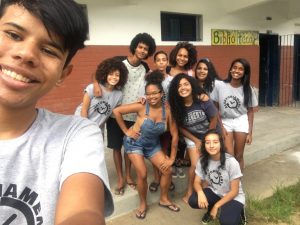
Pauline Batista is a first year doctoral student in the Learning, Leadership and Education Policy program in the Department of Educational Leadership. Her current work goes beyond country borders while challenging the traditional approach to research, as she incorporates film directed by student responses into her final product.
Batista’s research focuses on the United Nations Educational, Scientific and Cultural Organization (UNESCO)'s power over Educational Policy & Curriculum in Latin American (Traditional) Communities that have obtained UNESCO's Heritage Site titles. The methodology for this data collection draws from yPAR (Youth Participatory Research) and other participatory research methodologies, in which the objective is to center students as co-researchers during the data collection process. In this way she is empowering students in this community to speak out about their educational experiences and capture the attention of policymakers through film and digital media.
Batista has recently returned from a self-funded, pre-research trip in Brazil where she established connections and gathered information for the basis of her research. She will be returning to South America this summer to design a Participatory Video Initiative at previously selected schools, with the help of El Instituto’s Predoctoral Fellowship and the Tinker Fellowship. This Participatory Video initiative will entail a two week-long filmmaking workshop in which student-learners will be offered basic film making lessons, discuss what they believe are relevant issues for their communities by engaging in various activities, and gain experience by documenting key concepts, directly from the field. Rooted in Paulo Freire’s participatory action framework, the goal of this initiative is to capture the attention of local policymakers by showcasing the students’ ideas and critiques of their schoolwork under UNESCO’s influence, using short films.
This trip will include schools in Cartagena, Colombia and Paraty, Brazil where Batista is originally from. Batista is humbled and motivated by the opportunity for her work to impact her own community as she explains,
“It is rather different when you go back to your community as a scholar with a purpose. I had to be very careful and very open to hear from the community, because I believe that this is part of my duty as I was given the privilege of being educated.”
During her initial trip this past winter, Batista met with students who, in her words, "run schools." These students had a mature understanding of the oppression the education system possesses and how the system was not designed for them. This perspective fostered incredible conversations with the students’ ideas surrounding what their education should look like. “I have been learning that schooling demands are changing, but oppression remains, therefore as educators our work must serve as a medium of expression for these communities,” explains Batista on her takeaways thus far from this unique research endeavor.
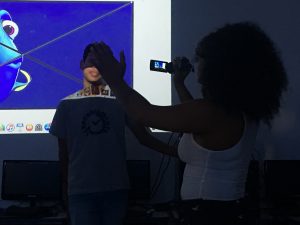
Batista's passion was ignited during her studies at the University of Connecticut’s El Instituto where she achieved an M.A. in International Studies (Latino & Latin American Studies). The theoretical body of work that she was exposed to during her studies motivated her to become an educational advocate for her own community as well as others in South America. For this reason, she decided to focus her research on communities with Educational Policies that are not necessarily reflective of the communities' desires and needs as she entered the Learning, Leadership and Educational Policy Program at the University of Connecticut.
Batista currently studies under Dr. Erica Fernández and Dr. Kimberly LeChasseur serves as her Graduate Assistantship manager. She thanks EDLR’s incredible faculty for introducing her to new ideas and perspectives, which have broadened her perception of the world and how the educational model of the U.S. has been influencing Latin American communities. The knowledge she is continuously building in her work with EDLR mentors drives Batista, and she is honored to share that with the communities she is working in.
Batista plans on traveling to Brazil on July 17, 2018 and to Colombia on August 1, 2018 to host the Participatory Video Initiatives for students. The Department of Educational Leadership looks forward to watching Batista’s research develop further and for the premier of the films on Vimeo when the project is complete. This is only the beginning of Batista’s journey and she hopes to expand her research efforts so that it is applicable and relevant to communities across South America.
10 Questions With Ph.D. Students in Educational Leadership
In our recurring 10 Questions series, the Neag School catches up with students, alumni, faculty, and others throughout the year to offer a glimpse into their Neag School experience and their current career, research, or community activities.
Learning, Leadership, and Education Policy (LLEP) is a doctoral program available through the Neag School’s Department of Educational Leadership, offering concentrations in three areas: adult learning; leadership and education policy; and sport management. This installment of “10 Questions” connects with two current Ph.D. candidates in the LLEP program:
Shannon Holder of Hartford, Conn., is currently a doctoral student in the Neag School’s LLEP program with a concentration in leadership and education policy. She also is co-host of an education-focused podcast titled EduCulture. She completed her bachelor’s degree in history and master’s degree in teaching at Hampton University in Hampton, Va.
Jesse Mala ’14 MS, a native of New Britain, Conn., and a veteran of the U.S. Army, earned his bachelor’s degree in physical education from Central Connecticut State University and his master’s in exercise science from UConn. His concentration in the LLEP doctoral program is sport management.
Where did your interest in your particular LLEP concentration originate, and how did you come to realize that you wanted to pursue a Ph.D. — and, ultimately, a career — in that field?
SH: I was a teacher for eight years, and I wanted to impact educational policy. I knew UConn had the leadership and education policy concentration, so I decided to apply. As a teacher, I felt that there were always new policies being implemented that didn’t seem like a match for the students I taught every day. It felt like no one was listening to teachers, and teachers were also being blamed for the problems in schools. Teachers around me were frustrated, and I wanted to do something to help them. At UConn, I’m constantly thinking about my former coworkers and reflecting on the frustration that they expressed to me. I also think about the past students I had and how I could change what they experienced in the classroom.
JM: I took a graduate course called sport-based youth development with [Professor Jennifer] McGarry, and throughout the whole course, the content just resonated with me. One aspect of the course examined how sport can be used as a tool to teach life skills among youth in poverty, which was basically my life experience. I enjoyed and believed in the concepts so much, I knew I had to get into this field.
How have your current and/or past experiences led you to where you are now?
SH: In the back of my mind, I always thought I could pursue a doctorate, but it took me a while to make the decision to leave the classroom. I was raised in Hartford, Conn., by my mother, a middle school music teacher in Hartford Public Schools. She instilled in me at an early age that education was extremely important. As a single mother, she made sure I was exposed to opportunities through school and my community; her master’s and bachelor’s degrees were from Howard University and New York University, and she was committed to making sure that I had similar opportunities to pursue my passions. I’ve always known that education was an American right, but as I moved through school, I also recognized that the quality of education was not the same for everyone.
When I was going into third grade, my mother transferred me to parochial school from my neighborhood public school. This early experience made me see the disparities in education at a very young age. I knew I was behind other students because I had to stay after school to practice skills my peers had learned in second grade. I also knew that my mom was paying tuition for me to attend my new school — a burden for her. This inspired me to pursue education and create a more equitable system where it doesn’t matter where you live or whether your parents can afford to send you to another school to get an excellent education.
JM: I grew up in the projects in New Britain, and for the first 15 years of my life lived in poverty. Yet in the midst of poverty, I found an outlet in sport. Participating in youth sports taught me basic life lessons and gave me the opportunity to practice these life skills. I feel like the foundations of perseverance, discipline, and resilience were laid while I was playing youth sports. These skills have helped me throughout my military and academic career. So when I found out there was a field of study that actually examines experiences of young persons in poverty playing sports and the benefits and skills that are transferred to other domains, I realized that this is what I wanted to study.
“I have learned a great deal about school leaders: both the challenges they face, and efforts to support them to make the changes we need.”
— Shannon Holder, LLEP Ph.D. Candidate
What is the focus of your dissertation research? What about this particular topic interests you?
SH: I’m currently working on my qualifying paper, which is a qualitative study of high school teachers that examines how they made sense of a detracking reform. I will continue studying detracking for my dissertation. I would like to do a case study of multiple schools that are detracked and study how it has impacted teachers, students, and the school community.
JM: My dissertation is examining the relationship of sport and physical activity participation on cognitive development and stress regulation among youth in poverty. I hope to grant insight into the cognitive and physiological benefits of sport and physical activity among youth in poverty, hopefully making a case that sport and physical activity can act as a buffer to the negative effects of stress on the brain. This topic interests me because this basically examines my experiences as a child who grew up in poverty and participated in sports and physical activity. I will be defending my dissertation in the late spring of 2018.
What are your future career goals? How do you envision your Ph.D. in LLEP helping you to meet those goals?
SH: After graduating, I want to be a professor at a research institution. The LLEP faculty have helped develop my research and writing skills. Jennie Weiner, [assistant professor and] my advisor, has exposed me to many opportunities so that I am prepared for the professorship.
JM: I would like to be a professor at a research university, where I would be able to do more research along my research interests. The classes, faculty and specifically my advisor in the LLEP program have helped me tremendously with training me how to think write and have provided me with the tools to be a successful scholar in my field.
What have you found most valuable about your experience in the Neag School’s LLEP doctoral program?
SH: I have learned more about how we are more segregated than we were in the 1960s. Even in areas where there is desegregation, racialized tracking within schools maintains the segregation status quo, perhaps more covertly. I have also learned a great deal about school leaders: both the challenges they face, and efforts to support them to make the changes we need.
JM: My most valuable experience would be learning how to be a scholar with my advisor, and the relationships built with my fellow Ph.D. students.
“I feel like the foundations of perseverance, discipline, and resilience were laid while I was playing youth sports. … When I found out there was a field of study that actually examines experiences of young persons in poverty playing sports and the benefits and skills that are transferred to other domains, I realized that this is what I wanted to study.”
— Jesse Mala, LLEP Ph.D. Candidate
How has your perspective changed over the course of your time in the LLEP doctoral program, or what important lessons have you learned?
SH: I left the classroom with a very narrow view of policy research. I have a better understanding of how policy is made and then implemented in schools.
JM: I feel like each class helped me expand my knowledge as a scholar and pushed me to practice different skills as a future scholar. A very important lesson that I’ve learned is that all social/biological phenomena is so complex. A simple explanation to a complex issue just reveals a limited understanding of the phenomena of interest. My work as a scholar addresses a very small piece of very complex issue.
How would you define an effective leader?
JM: An effective leader is one who cares, empowers, and is a living example of the principles they teach.
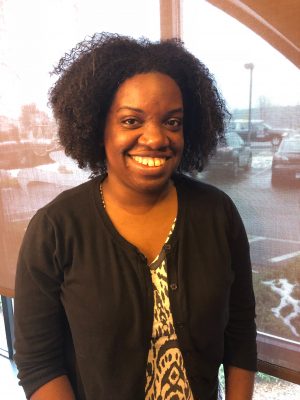
Who has been your greatest mentor? What kind of support or insight have they provided to you along the way?
SH: Jennie Weiner my advisor has been my best mentor. She has been the greatest support and motivator to me at the University of Connecticut. As my advisor, she makes sure that I’m on track with my coursework and I’m developing as a scholar. She frequently treats me as an equal and pushes me to apply for opportunities at UConn and beyond. This past year she helped me apply for a grant and a leadership opportunity and I received both. If I had not had Jennie’s support, neither of these opportunities would have occurred.
What is one thing that most people perhaps don’t know about you, but that you believe gives you a unique or valuable perspective?
SH: I love futuristic science fiction books and movies. I think my love of sci-fi helps me to always have in the back of my mind that innovation and change are possible even though the world can feel overwhelming and negative sometimes.
JM: Upon meeting me, you probably wouldn’t guess that I spent the first 15 years of my life in urban poverty. I believe this experience gives me a valuable perspective as a scholar who is examining issues among youth in poverty.
Why did you choose the Neag School for your doctoral program?
SH: Wherever you go in the U.S., children of color lag behind their peers in most academic areas and access to a quality education. Of course, creating access to quality education for urban students is a thorny problem that eludes simple, quick solutions. And the current emphasis on fast results does not encourage the kind of deep-rooted reform our schools and communities need. In fact, it is reinforcing historical trends, and children of color suffer and are receiving an inferior education. I’ve seen this firsthand as Hartford students are grade levels behind their suburban peers. UConn was doing research on these inequalities, which is why I wanted to be a student here.
JM: My advisor, Jennifer McGarry, studies sport-based youth development, which is my passion.
What advice would you give to those who may be interested in pursuing a Ph.D. through the Neag School’s LLEP doctoral program?
SH: It’s a great program, and it’s good to brainstorm some topics you would be interested in studying prior to starting the program. Education is a large field, so it’s a good idea to know what you would like to focus on.
JM: If you have the opportunity, do it! Talking to other doctoral students on campus and from other universities, I believe that my experience here at UConn in the LLEP doctoral program is very special and unique. I have felt so supported by my advisor both academically and personally to be the scholar and person that I envision myself to be. Also, experiencing this program with such a racially and experientially diverse group of students has been awesome. When I graduate this spring, I will miss my Neag School LLEP family.
Learn more about the LLEP program at llep.education.uconn.edu. Read other installments of the Neag School’s 10 Questions series.
EDLR Student Researchers Stand Out at Conferences
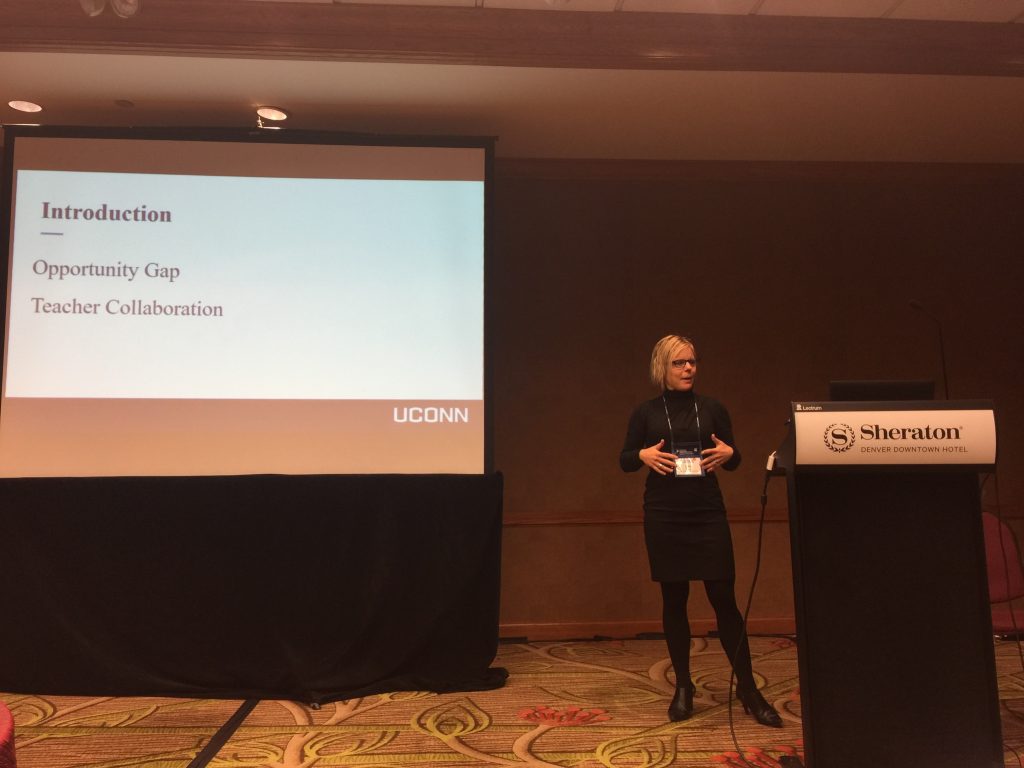
The 31st annual University Council for Educational Administration (UCEA) Convention was recently held on November 15-19, 2017 at the Sheraton Denver Downtown Hotel in Denver, CO. This year, six students from the University of Connecticut’s Department of Educational Leadership presented their research. Daron Cyr, Jonathan Carter, Shannon Holder and Alexandra Lamb represented the Learning, Leadership and Educational Policy Program, while Scott Hurwitz and Lisa Sepe represented the Doctorate of Education (Ed.D.) Program.
The UCEA Convention engages participants in discussions about research, policy, practice and preparation in the field of education with a specific focus on educational leadership. This year’s theme was Echando Pa’lante: School Leaders (Up)rising as Advocates and (Up)lifting Student Voices, and the intended discussion was centered around encouraging opportunities for reflective dialogue regarding the educational contexts that students, teachers, principals, and superintendents will be facing within a changing national climate and its impact on educational policy.
Such an opportunity has a meaningful impact on the development of doctoral students as researchers in addition to their professional advancement. Scott Hurwitz, a third-year doctoral student pursuing his Ed.D. and the current principal of Gideon Welles School in Glastonbury, CT, commented on the experience saying,
“Presenting at conferences like UCEA affords us the opportunity to collaborate with university faculty and leadership scholars around the globe. We are able to share our research and receive feedback that informs our current and future work.”
Hurwitz’s presentation was titled, “Institutionalizing School Security: A Case Study,” for which he utilized two branches of institutional theory, logics and myths, and symbols to analyze the organizational shifts that took place in Connecticut schools following the tragedy at Sandy Hook Elementary School. He worked on this research with the Department of Educational Leadership’s Dr. Sarah Woulfin and Dr. Jennie Weiner, who he said, “...served as guides and mentors,” in helping him produce relevant and robust research. Hurwitz is an accomplished researcher, who recently defended his Capstone proposal in October 2017. His proposal examined the how school leaders frame policy specifically around Connecticut’s anti-bullying policy.
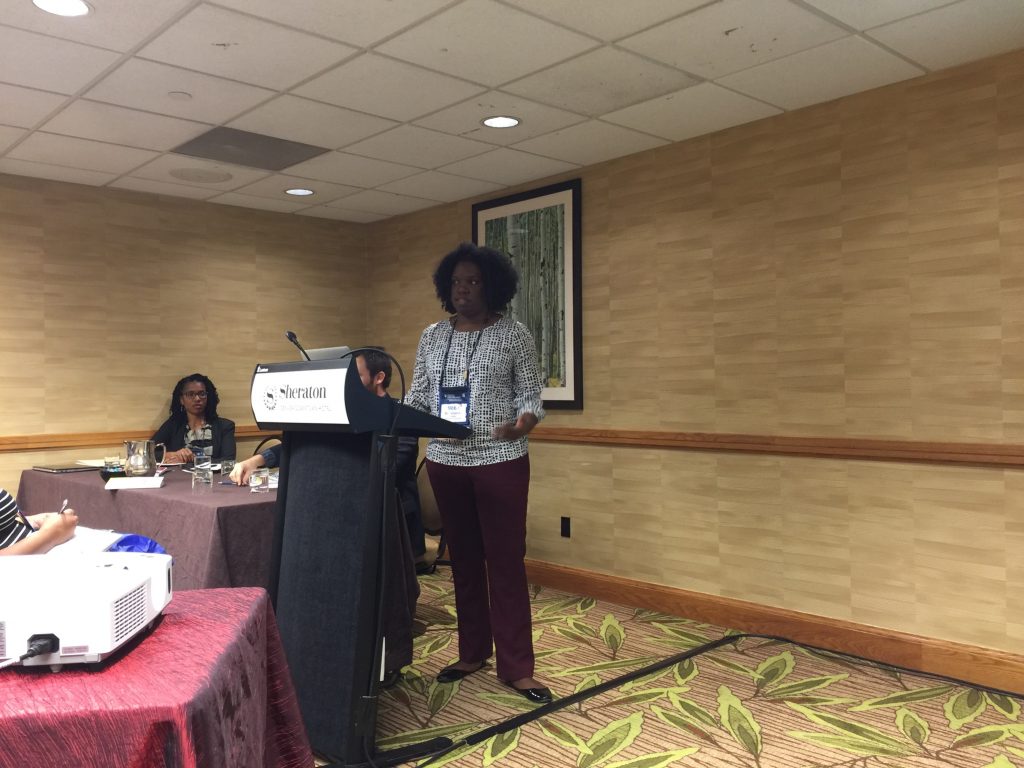
Shannon Holder, who is a third year doctoral student in the Leadership and Educational Policy program presented two projects at this years UCEA conference. Her first presentation was titled, “The Sheff v. O’Neill Decision and Interest Convergence,” where she analyzed the ruling using Derrick Bell’s (1980) Interest Convergence principle which suggests the interest of Blacks in achieving racial equality will be accommodated only when it converges with the interests of Whites. Her findings revealed two themes: interests converge in the court documents, and interests have diverged since the case was decided. Holder’s second presentation was titled, “Teacher Sensemaking in the Detracked High School Classroom.” This qualitative study of high school teachers examined how they made sense of a detracking reform. Sensemaking theory is utilized to analyze participants’ conceptualization of detracking. Holder found that participants tended to have different definitions of detracking and as participants transitioned to teaching in a detracked environment those definitions became increasingly amorphous. These findings signal that teachers may create definitions of detracking that diverge from its formal intentions with implications for policymakers and practitioners.
Like Hurwitz, Holder had previous exposure to UCEA as they both presented at the 2016 conference in Detroit, MI. Jonathan Carter, a 2nd year Ph.D. student in the Leadership and Educational Policy program was a newcomer to the student research scene as the 2017 UCEA Conference was his first time presenting research with the Educational Leadership Department at UConn. His research, titled, “Supplementing the core curriculum in a university principal preparation program,” looked at an improvement initiative undertaken by one university’s principal preparation program to develop a supplemental workshop model to address identified gaps in the core curriculum. Carter was guided by EDLR’s Dr. Richard Gonzalez. As a researcher, Carter found the entire experience valuable to his development saying, “The feedback from other scholars in the field was very useful and will help guide our revisions as we prepare the paper to submit for publication.”
The UCEA conference was one of three academic conferences that the University of Connecticut’s Department of Educational Leadership students had the opportunity to present at this past year, including the The Harvard Graduate School of Education Student Research Conference in which six students attended and presented their research and the American Educational Research Association (AERA) Annual Meeting where five different students were able to present at.
Chelsea Connery, a second year Ph.D. student in Leadership and Education Policy, who attended the Harvard Conference offered a sentiment that all of the student researchers could identify with as she explained,
“Attending conferences such as these, being around motivated and like-minded individuals, can be reinvigorating, which is important, especially in the current sociopolitical context; it can re-foster your hope and resilience.”
The Department is extremely proud of the research and work that our students continue to produce, and thankful for the brilliant and caring faculty that always support them.
Access the full 2017 UCEA Convention program at ucea.org/conference/program-2017.
EDLR Congratulates Dr. Carrie Graham
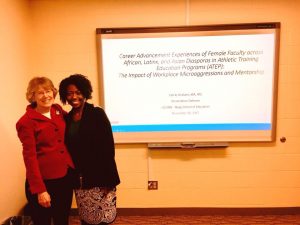 Congratulations to the newest Adult Learning doctoral candidate, Dr. Carrie Graham on the successful defense of her dissertation, “Career Advancement of Female Faculty Across African, Latinx, and Asian Diasporas in Athletic Training Education Programs: The Impact of Workplace Microaggressions and Mentoring.
Congratulations to the newest Adult Learning doctoral candidate, Dr. Carrie Graham on the successful defense of her dissertation, “Career Advancement of Female Faculty Across African, Latinx, and Asian Diasporas in Athletic Training Education Programs: The Impact of Workplace Microaggressions and Mentoring.